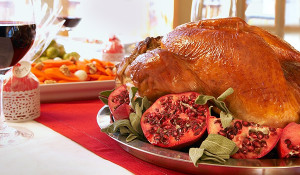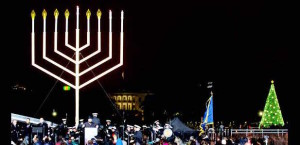 When is it okay to participate in holidays traditionally reserved for others?
When is it okay to participate in holidays traditionally reserved for others?
Most of us are preparing for Thanksgiving. We have embraced Thanksgiving as the quintessential American holiday, and as such, we will be planning travel to visit other relatives, prepare a bountiful table and of course watch the Macy’s parade in the morning and football thereafter. American Jews embrace Thanksgiving, just like all other Americans, but we struggle with other American holidays. Although almost all of us celebrate Thanksgiving, many of us still wrestle with Halloween and most of us would not consider celebrating Christmas.
These three holidays are iconic parts of living in America. And all three share religious backstories. Christmas as the celebration of the birth of Christ is certainly the most obvious. Halloween is grounded in pagan rituals and Thanksgiving is essentially a Christian Sukkot, rooted in a Christian religious tradition of gratitude for God’s bounty. What makes the secularization of this holiday such that we are able to embrace it and celebrate, stripping it of its original grounding and retelling the story in a way that it can become ours, and why are we unable to do likewise with the others?
Many of us kept our children from Trick-or-Treating worried that dressing up in a costume and participating was an affirmation of a pagan ritual of witches and warlocks. However, Halloween has been stripped of its religious meaning. I read recently how one rabbi used a creative Jewish lens through which the celebration included sharing excess candy collected by her children with the less fortunate. One of my fonder memories is taking my son by the hand, dressed in a costume that mom created, while I was dressed up as a giant hamburger. The only bad part of Halloween was the stomach-ache and crash after my sugar high from over indulgence.
Christmas is a more complicated situation. But in this age of acculturation, interfaith couples and of course commercialization, there are places where we can enjoy the holiday. I say that very cautiously and carefully because I do not want to be disrespectful of those that hold this as a sacred holiday. However, the Coca-Cola inspired Santa Claus and Rudolf the Red Nosed Reindeer both pale in comparison when I faithfully listen as Bing Crosby sings White Christmas in the movie of the same name (Bing also sang it in Holiday Inn). Irving Berlin’s classic homage yearns for us to be able to embrace this American holiday as our own. As many of you know, coming from an interfaith background, I am familiar with the beauty of a family gathering, honoring my grandmother, and sharing gifts on a day devoted to love and togetherness. We as modern American Jews need to figure it out. And in our own unique way, we have already begun.

We have substantially ramped up the Chanukah holiday celebration. This is however a contrived response to a Christmas in which we long to participate. Without reservation I fully support the increase in joy we bring to our “minor” religious holiday including the latkes, Chanukah cards, 8 days of presents, parties and so on. We go a step further in our “Chinese food and a movie” ritual on December 25. The question is whether we maintain a fictional “Chinese wall” separating holidays, holding steadfast to our modern re-interpretation of Chanukah, or can we consider an American Secular Christmas? I submit that celebrating one holiday does not preclude the other, nor does such a celebration threaten our core beliefs. Instead, acknowledging Christmas in a modern American Jewish context can bring us in closer alignment with the Jewish dream of acceptance in America and more importantly, serve as a significant learning opportunity to share with our children what these holidays might mean metaphorically and Jewishly.
Happy Holidays and Chag Sameach!
